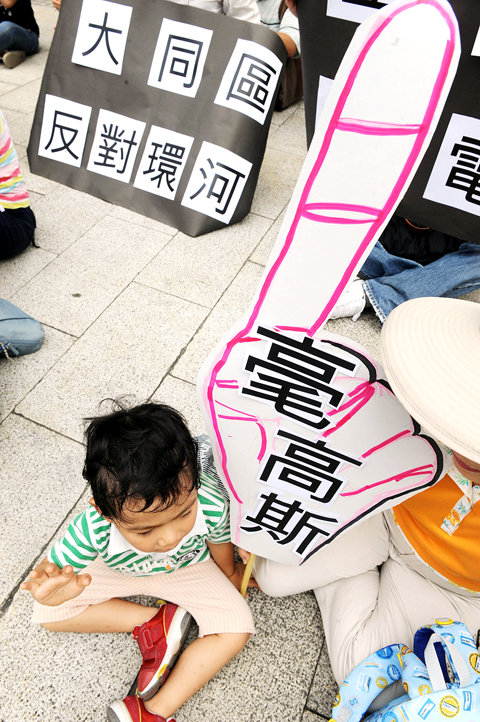Representatives of environmental groups gathered in front of the Environmental Protection Administration (EPA) yesterday to urge the government to lower electromagnetic wave safety standards to a maximum of 1 milli-Gauss (mG).
The agency is considering lowering electromagnetic wave safety standards by 10 percent for “sensitive regions” such as schools, hospitals and residential areas, but the activists said that was not enough.
Taiwan Electromagnetic Radiation Hazard Protection and Control Association chairwoman Chen Chiao-hwa (陳椒華) said the EPA was considering lowering the standard for sensitive areas from 833mG to 83.3mG.

PHOTO: CNA
“From WHO data, we know that advanced countries such as the US and Switzerland have an electromagnetic wave safety limit of 1mG. We fear that as Hsiao is on the EPA’s expert panel, his statement could cause a public misunderstanding,” she said.
She was referring to a recent remark by National Taiwan University of Science and Technology electric engineering assistant professor Hsiao Horng-Ching (蕭弘清) that even if an environment or location had an electromagnetic wave level of 8,300mG, there would be little harm to human health.
“Even at 83.3 milli-Gauss, people are still exposed to high health risks and are likely to develop chronic illnesses such as cancer, or give birth to children with mental retardation or other birth defects,” Chen said.
The environmental groups urged the government to follow the example set by other countries and set the nation’s safety limit to 1mG.
Air Quality Protection and Noise Control Director-General Hsieh Yen-ju (謝燕儒) said the EPA was not ready to decide on whether to lower the limit.
“To make sure we cover all the bases, we will hold more meetings with environmental groups, the National Communications Commission, the Department of Health and media representatives soon,” Hsieh said.
As for the debate over 1mG and 83.3mG standards, Hsieh said that since every country is different, the EPA would collect more information to determine what was best for Taiwan.

The Grand Hotel Taipei on Saturday confirmed that its information system had been illegally accessed and expressed its deepest apologies for the concern it has caused its customers, adding that the issue is being investigated by the Ministry of Justice Investigation Bureau. The hotel said that on Tuesday last week, it had discovered an external illegal intrusion into its information system. An initial digital forensic investigation confirmed that parts of the system had been accessed, it said, adding that the possibility that some customer data were stolen and leaked could not be ruled out. The actual scope and content of the affected data

DO THEY BITE IT? Cats have better memories than people might think, but their motivation is based entirely around the chance of getting fed Cats can remember the identity of the people who fed them the day before, Taipei-based veterinarians said on Friday, debunking a popular myth that cats have a short memory. If a stray does not recognize the person who fed them the previous day, it is likely because they are not carrying food and the cat has no reason to recognize them, said Wu Chou Animal Hospital head Chen Chen-huan (陳震寰). “When cats come to a human bearing food, it is coming for the food, not the person,” he said. “The food is the key.” Since the cat’s attention is on the food, it

‘LIKE-MINDED PARTNER’: Tako van Popta said it would be inappropriate to delay signing the deal with Taiwan because of China, adding he would promote the issue Canadian senators have stressed Taiwan’s importance for international trade and expressed enthusiasm for ensuring the Taiwan-Canada trade cooperation framework agreement is implemented this year. Representative to Canada Harry Tseng (曾厚仁) in an interview with the Central News Agency (CNA) said he was increasingly uneasy about Ottawa’s delays in signing the agreement, especially as Ottawa has warmed toward Beijing. There are “no negotiations left. Not only [is it] initialed, we have three versions of the text ready: English, French and Mandarin,” Tseng said. “That tells you how close we are to the final signature.” Tseng said that he hoped Canadian Prime Minister Mark Carney

President William Lai (賴清德) yesterday bestowed one of Taiwan’s highest honors on Saint Vincent and the Grenadines (SVG) Ambassador Andrea Clare Bowman in recognition of her contributions to bilateral ties. “By conferring the Order of Brilliant Star with Grand Cordon on Ambassador Bowman today, I want to sincerely thank her, on behalf of the Taiwanese people, for her outstanding contribution to deepening diplomatic ties between Taiwan and SVG,” Lai said at a ceremony held at the Presidential Office in Taipei. He noted that Bowman became SVG’s first ambassador to Taiwan in 2019 and